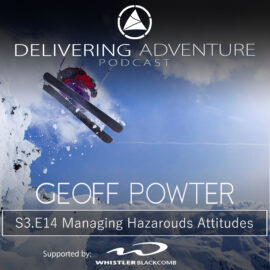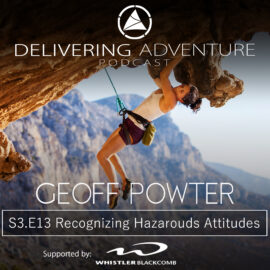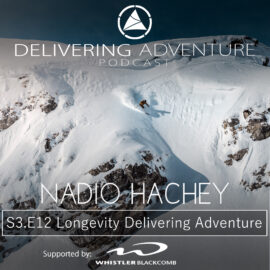
How to Coach People Through Danger with Derek Foose
What does it take to coach someone through danger? When it comes to taking risks, danger can come in the form of real and perceived threats to our safety and well being. Regardless of whether the danger is real or imagined, when people feel threatened, even in a sub conscious level, they can inadvertently move I to their survival zone. When this happens, performance can suffer, and people can find themselves increasing the probability of experiencing the very consequences they are hoping to avoid.
Helping us to explore what it takes to coach people through danger effectively is Derek Foose. Derek is the founder and head coach of the Whistler Free Ride Club. He guides and works as a staff trainer for Extremely Canadian. Derek is also a Course Conductor and Course Developer for the Professional Ski Instructors of Canada’s Big Mountain Pathway.
In addition to coaching and guiding, Derek has tapped into his extensive experience as a broadcast host for the Freeride World tour. He is on the Board of Directors Coaches Chair for International Freeskiers and Snowboarders Association.
In this engaging episode, we discuss the key strategies that adventure coaches, instructors and guides can employ to help the people they are coaching succeed on the face of danger.
Key Takeaways
Preparation: Preparing people before they are put in a high-risk situation – regardless of whether it is perceived or real – is key. It is very difficult to teach someone how to handle high risk situations, in high-risk situations. The skills needed to perform in the face of danger have to learned and practiced where people can make mistakes with low consequences.
Build trust: Letting people talk, showing people that you care and helping people to succeed are key components of building trust. When people trust their coach, they are more likely to believe in themselves. Conversely, when their coach believes in them, they are more likely to stay with their coach.
Give people control, where you can: A coach can do this by letting people talk themselves into or out of situations as much as possible. It is almost always better to let people come to the right conclusion on their own. What a coach wants to avoid is talking someone into doing something when they don’t feel ready, and then having that person fail. When this happens, the failure is going to be on the coach. This will erode trust and damage relationships.
Stay Calm: Calmness creates calmness. But no one has ever calmed down by being told to calm down! If a coach shows signs of stress or a lack of confidence, the people they are coaching are likely to follow suit. Using a reassuring tone, positive language and keeping people focused on believing success is possible, are key elements of creating s calm atmosphere.
Keeping people close: When danger and stress levels increase, bringing people closer to the coach – when it’s safe – can help to reassure people. It can also help to show people what they need to do to succeed.
Keep feedback simple: The more complex the situation, the simpler the instructions need to be. When people are faced with high-risk situations, feedback needs to be simple, relatable and familiar. Now is not the time for complex explanations or new skills.
Beware of Emotion: When people are stressed, it is common for them to lash out. This is especially true when you know each other well. As much as possible, try to stay focused on what needs to happen and avoid taking things personally should things get heated.
Guest Bio
Derek Foose is the founder and head coach of the Whistler Free Ride Club. He guides and works as a staff trainer for Extremely Canadian. Derek is also a Course Conductor and Course Developer for the Professional Ski Instructors of Canada’s Big Mountain Pathway.
In addition to coaching and guiding, Derek has tapped into his extensive experience as a broadcast host for the Freeride World tour. He is on the Board of Directors Coaches Chair for International Freeskiers and Snowboarders Association. He also co-hosts The Freeride Guide Podcast.
Guest Links
Whistler Freestyle Club: https://www.whistlerblackcomb.com/plan-your-trip/ski-and-ride-lessons/products/freeride-club-ages-9-18
International Freeskiers and Snowboarders Association: https://www.ifsafreeriders.org
Freeride World Tour: https://www.freerideworldtour.com
The Freeride Guide Podcast: https://podcasts.apple.com/ca/podcast/the-freeride-guide/id1725679636
Follow or Subscribe
Don’t forget to follow the show!
Share & Social Links










